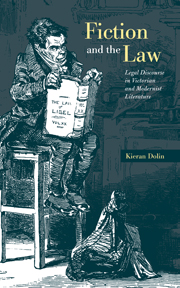Book contents
- Frontmatter
- Contents
- Acknowledgments
- 1 Narrative forms and normative worlds
- 2 The modern Western nomos
- 3 True testimony and the foundation of nomos – The Heart of Midlothian
- 4 Reformist critique in the mid-Victorian “legal novel” – Bleak House
- 5 Representation, inheritance and anti-reformism in the “legal novel” – Orley Farm
- 6 Power, chance and the rule of law – Billy Budd, Sailor
- 7 From sympathetic criminal to imperial law-giver – Lord Jim
- 8 Freedom, uncertainty and diversity – the critique of imperialist law in A Passage to India
- 9 Settling out of court
- Notes
- Index
7 - From sympathetic criminal to imperial law-giver – Lord Jim
Published online by Cambridge University Press: 18 December 2009
- Frontmatter
- Contents
- Acknowledgments
- 1 Narrative forms and normative worlds
- 2 The modern Western nomos
- 3 True testimony and the foundation of nomos – The Heart of Midlothian
- 4 Reformist critique in the mid-Victorian “legal novel” – Bleak House
- 5 Representation, inheritance and anti-reformism in the “legal novel” – Orley Farm
- 6 Power, chance and the rule of law – Billy Budd, Sailor
- 7 From sympathetic criminal to imperial law-giver – Lord Jim
- 8 Freedom, uncertainty and diversity – the critique of imperialist law in A Passage to India
- 9 Settling out of court
- Notes
- Index
Summary
Lord Jim was published in book form in 1900, the penultimate year of Queen Victoria's reign and the threshold of a new century. This pivotal date provides the historical clue which dispels any initial surprise that Joseph Conrad should be a subject of this study of novelistic representations of law. For, in the first place, Victoria ruled not only Britain but an Empire “beyond the seas,” and British law provided one framework for both the colonies and the maritime service which connected them with “home.” As Conrad derived much of his novelistic material from his own experience in the British Merchant Marine and from stories he heard during his years at sea, it is understandable that law should figure in some of his novels. Second, Richard Weisberg has argued that the modern period is characterized by the emergence of law as the dominant discourse of value and that the modern novel is deeply and critically engaged by legalism and the lawyer-figure. Conrad's modernism is a well established proposition of literary history, and in Lord Jim the legal process is examined in the context of modernist normative instability and metaphysical uncertainty. The juxtaposition of these two influences, Victorian and modern, creates a tension between fidelity to tradition, to the claims of an inherited nomos, and simultaneously, a radical attack upon that nomos.
Such ambivalence has been identified as a feature of the modernist outlook: Franz Kuna argues that what Nietzsche labelled “the Janus-face, at once Dionysiac and Apollonian,” in which “whatever exists is both just and unjust, and is equally justified in both,” finds its clearest embodiment in the novels of Conrad.
- Type
- Chapter
- Information
- Fiction and the LawLegal Discourse in Victorian and Modernist Literature, pp. 145 - 168Publisher: Cambridge University PressPrint publication year: 1999



